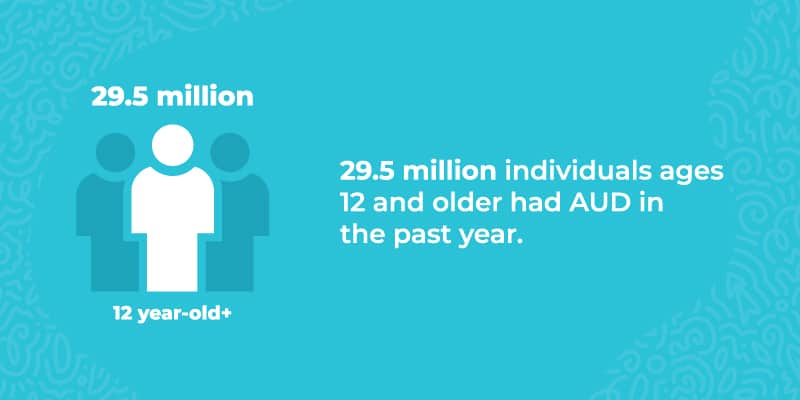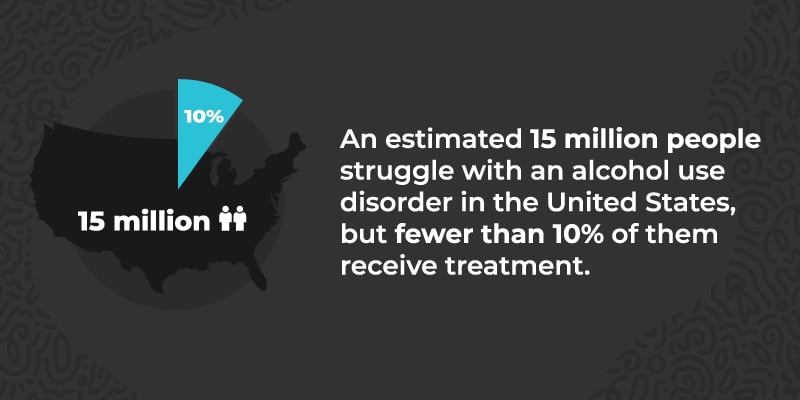Alcohol Use Disorder: Find Healing and Hope at Vista Taos
Introduction
- What alcohol use disorder is
- Symptoms of alcohol use disorder
- How alcohol use disorder is diagnosed
- Symptoms of alcohol withdrawal
- Risk factors for AUD
- The dangers of AUD
- How common is alcohol use disorder?
- Treatment options

What is Alcohol Use Disorder?
Alcohol Use Disorder: an Overview
Consequences of AUD
- Liver disease
- Cancer
- Depression
- Anxiety
- Other physical and mental health conditions
Symptoms of Alcohol Use Disorder
- Cravings or a strong urge to drink alcohol
- Difficulty controlling the amount of alcohol consumed
- Continuing to drink despite negative consequences, such as relationship problems or health problems
- Spending a lot of time drinking or recovering from the effects of alcohol
- Developing a tolerance to alcohol and needing to drink more to achieve the desired effect
- Experiencing withdrawal symptoms when attempting to stop drinking or cutting back
- Drinking to cope with stress or to avoid withdrawal symptoms
- Neglecting responsibilities or activities due to alcohol use
- Continuing to drink despite knowing it causes physical or mental health problems
- Giving up social or recreational activities in favor of drinking
How is Alcohol Use Disorder Diagnosed?
- Drinking habits
- Medical history
- Symptoms
Medical Evaluation
Psychological Evaluation
Screening Tests
Criteria for Diagnosis
Diagnostic Criteria
- Drinking more alcohol or for longer periods than intended
- Difficulty controlling or cutting down on alcohol use
- Spending a lot of time drinking or recovering from alcohol use
- Cravings or strong urges to drink
- Continuing to drink despite negative consequences, such as relationship problems or health issues
- Giving up important activities or social events to drink
- Developing tolerance to alcohol
- Experiencing withdrawal symptoms when attempting to stop or reduce alcohol use

Symptoms of Alcohol Withdrawal
- Tremors or shaking
- Sweating
- Nausea or vomiting
- Anxiety or agitation
- Insomnia
- Headache
- Rapid heartbeat
- Hallucinations
- Seizures
- Delirium tremens (DTs)
Delirium Tremens (DTs)
- Confusion
- Disorientation
- High fever
- Seizures
- Hallucinations
Withdrawal Symptoms Vary by Individual
Risk Factors for Alcohol Use Disorder
Genetics
Age
Environment
Mental Health
Social and Cultural Factors
Gender
Physical Health
How is AUD Dangerous?
- Social
- Physical
- Emotional
- Mental
- Financial
Social Impact
Physical Impact
- Liver disease
- Heart disease
- Cancer
- Gastrointestinal problems
- Neurological disorders
Emotional Impact
- Mood swings
- Depression
- Anxiety
- Anger and irritability
Mental Impact
- Memory
- Attention
- Decision-making abilities
Financial Impact
- The loss of income
- Increased healthcare costs
- Legal problems, such as DUI charges
Severity of These Impacts Varies
- The amount and frequency of alcohol consumed
- The presence of co-occurring disorders
- Individual vulnerability.

Is Alcohol Use Disorder Common?
AUD in the U.S.
AUD in Europe
AUD in Australia
AUD in Canada
AUD is a Global Issue
Treatment Options for Alcohol Use Disorder
Medications
- Acamprosate
- Naltrexone
- Disulfiram
Behavioral Therapies
- Cognitive-behavioral therapy (CBT): CBT, both in individual and group settings, can help individuals identify and change negative thoughts and behaviors related to alcohol use
- Motivational interviewing (MI): MI can help motivate individuals to make positive changes in their behavior
- Contingency management: Contingency management involves providing rewards or incentives for positive behavior changes
"In a group setting, cognitive-behavioral therapy (CBT) provides a unique dynamic where patients can share experiences, receive support, and learn from one another's perspectives. Group therapy fosters a sense of camaraderie and reduces feelings of isolation commonly experienced in addiction. Additionally, patients can practice interpersonal skills and receive immediate feedback, enhancing their social functioning. Conversely, individual therapy offers a more personalized approach, allowing for deeper exploration of individual challenges and tailored interventions. While group therapy emphasizes peer support and social learning, individual therapy provides focused attention on specific issues and promotes self-awareness. Both modalities complement each other in addiction treatment, offering a comprehensive framework."
What is Cognitive Behavioral Therapy?
Support Groups
Residential Treatment Programs
Self-Help Strategies
- Avoiding triggers
- Practicing stress-reduction techniques
- Developing a support network of family and friends

Available Treatment Options for Alcohol Use Disorder
- The severity of the condition
- Medical and psychiatric history
- Personal preferences
Mild to Moderate AUD
Severe AUD
Co-Occurring Disorders
Motivational Interviewing (MI)
Self-Help Strategies
Treatment is Specific to the Individual

How Can Vista Taos Help with Alcohol Use Disorder?
Lead the Life You Were Made For
Comprehensive Assessment
Individualized Treatment Plan
Medical Detoxification
Behavioral Therapies
- Cognitive-behavioral therapy (CBT)
- Dialectical behavior therapy (DBT)
- Motivational interviewing (MI)
- Motivational enhancement therapy (MET)
- Trauma-informed care
- Grief and loss therapy
- Mindfulness-based relapse prevention
- Yoga
- Family systems approach
- Recreational therapy
"Motivational Enhancement Therapy (MET) provides a person-centered, empathetic approach that explores and resolves ambivalence towards change. Through collaborative conversations and techniques like reflective listening and feedback, MET aims to increase intrinsic motivation, self-efficacy, and commitment to change. By focusing on strengths, setting realistic goals, and addressing discrepancies between current behavior and personal values, MET empowers individuals to make positive changes in their lives."
What is Dialectical Behavioral Therapy?
How Do These Therapies Help?
Support Groups
Aftercare Support
Support Tailored to Your Needs
Contact Vista Taos Today
Resources
- https://www.niaaa.nih.gov/publications/brochures-and-fact-sheets/understanding-alcohol-use-disorder
- https://www.mayoclinic.org/diseases-conditions/alcohol-use-disorder/symptoms-causes/syc-20369243
- https://www.medscape.com/answers/285913-41535/what-are-the-dsm-5-criteria-for-%20alcohol-use-disorder
- https://www.webmd.com/mental-health/addiction/alcohol-withdrawal-symptoms-treatments
- https://www.webmd.com/mental-health/addiction/delirium-tremens
- https://www.cdc.gov/alcohol/fact-sheets/mens-health.htm
- https://drugabusestatistics.org/alcohol-abuse-statistics/
- https://www.niaaa.nih.gov/publications/brochures-and-fact-sheets/alcohol-facts-and-statistics
- https://www.who.int/publications/i/item/9789241565639
- https://www.aihw.gov.au/reports/illicit-use-of-drugs/national-drug-strategy-household-survey-2019/contents/drug-types/alcohol
- https://www150.statcan.gc.ca/n1/pub/82-003-x/2014003/article/14039-eng.htm



